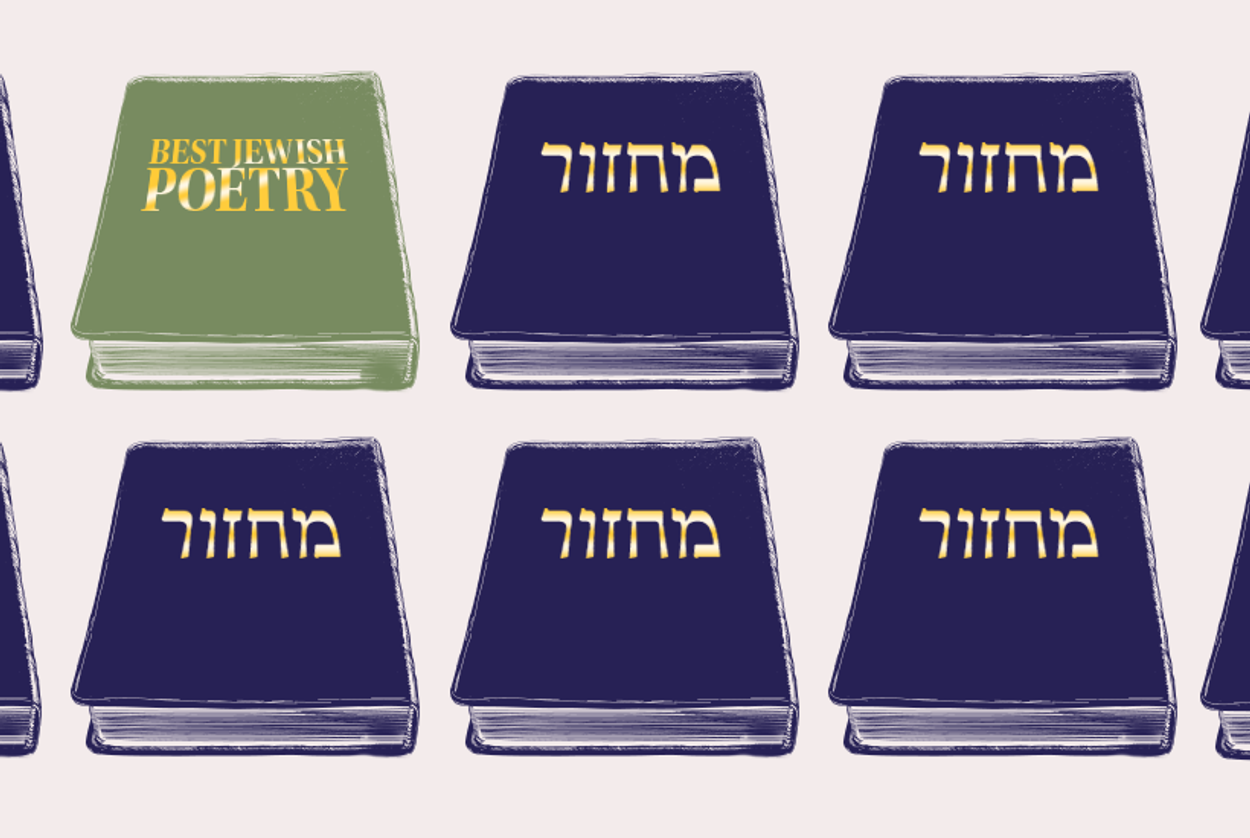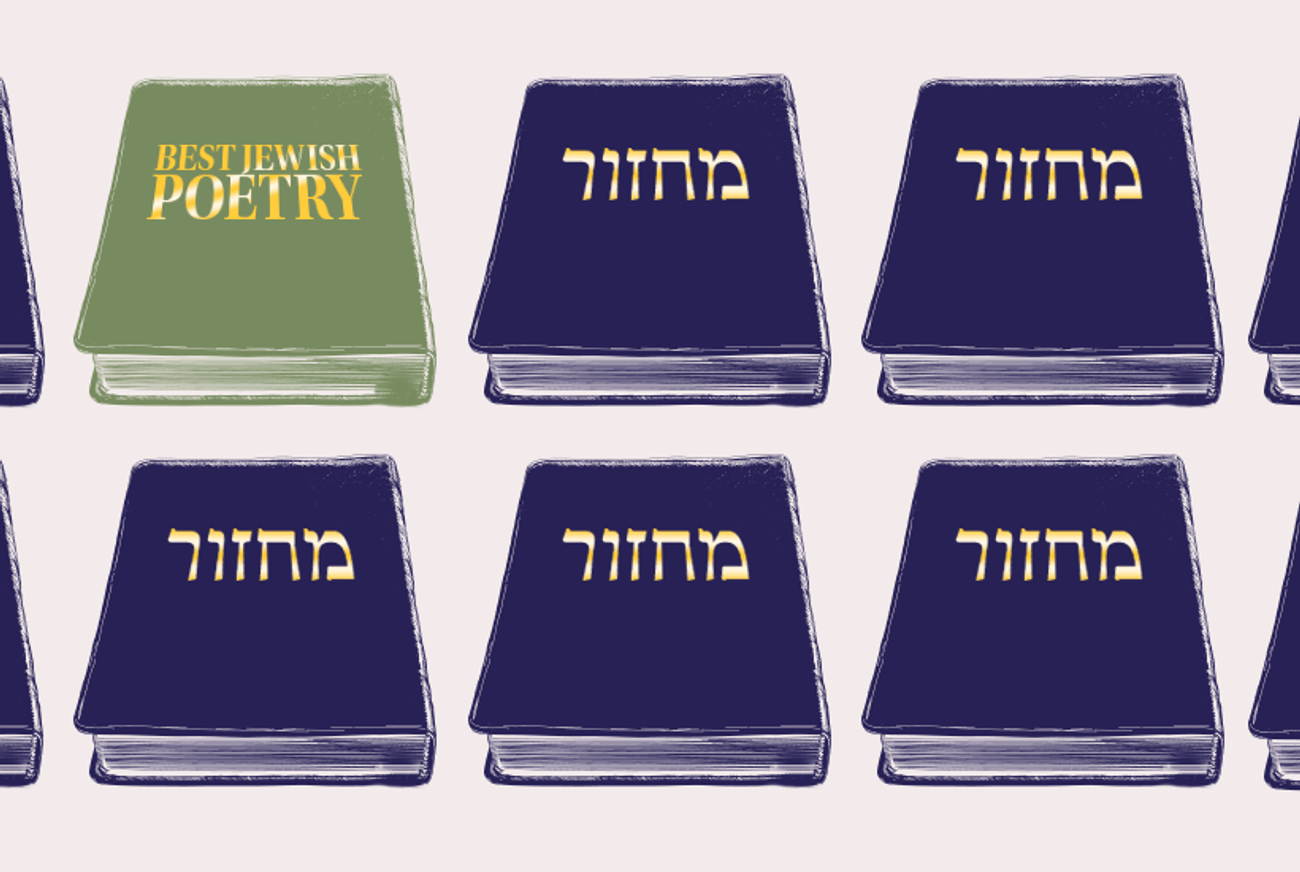Sneaking a Peek at Poetry on the High Holidays
Just because you’re in synagogue doesn’t mean you have to read what’s in the prayer book




Yom Kippur morning was promising. I stood wrapped in a tallis in the front row of a low-key Jerusalem synagogue looking at the sky through a large window. It was a relatively small place, but there was grandeur to the light filtering through, as if all that open air outside translated into a transcendent, spiritual sort of openness of the day itself. I felt inspired—for a second—only to suddenly realize that the incoming light was perhaps the only thing I found appealing about the experience.
I grew up in a world where religion was relegated to the realm of outdated, small-minded misconceptions. Our Ukrainian Jewish home was filled with great books, and there was no lack of serious conversation or old-school storytelling. Yet, as I realize in retrospect, I was starved for a spiritual dimension, for mythic and esoteric language capable of capturing the strangeness of my world, of my sense of being different from most of my peers. When I discovered and embraced Orthodox Judaism, for a while, it felt like homecoming.
That Yom Kippur in Jerusalem, over a decade later, was the tail end of that embrace.
Nothing bespeaks religious commitment more distinctly than a prayer book. One does not need to believe in God to observe kashrut or Shabbos—it can be a purely cultural or social matter. But the siddur—especially on High Holidays, when the page count is in the hundreds—stands as the testament of belief. You can’t read the day’s fill of prayers socially: You either direct them upward, or they weigh you down like a pile of unused bricks. That Yom Kippur in Jerusalem, though my practice had not yet begun to alter, I realized I had crossed a line when I decided would no longer force myself to open the siddur. It was filled with words that weren’t mine—that I did not choose—and represented sentiments I did not share.
I did want to stay in the synagogue, though. The sanctity of the day, the pleasure of being with others pulsated through me in counterpoint to the resignation. How do I spend the day, then? And the answer that came to me was simple: I’ll read.
Those who left the religious fold know the feeling very well: There’s absolutely nothing out there that can fully replace a belief and its “perks”—the sense of purpose, grounding communal feeling, the casual familiarity with the spiritual world. There’s the promise of illumination—and a language to explain it, too. Yet reading, in all of its experiential intensity, has always ranked high for me. From childhood onward, I read my way through all of my major self-realizations—found them all reading this book or that. The mind engages in conversation and self-inquiry under the cover of aesthetic experience.
The siddur offers a scripted conversation with the divine. Reading—poetry and other things of similar density—is more like overhearing shreds of a script; it is vastly open and unfinished. Prayers address a deity; poetry creates spaces for interpretation—leaping thoughts purposed with the discovery of one’s own intellectual and spiritual landscape.
The Jerusalem synagogue had a considerable library in the back, and in it an acquaintance of mine has left a familiar volume: Samuel Menashe’s New and Selected Poems. Menashe, a New York poet who died in 2011, was known for terse, spiritually grand pieces that, when touched, unfolded endlessly. Here’s one called “Apotheosis”:
Taut with longing
You must become
The god you sought—
the only one
The way a musical score starts with the indication of the key, this poem’s opening word sets the tone for everything that is about to come. The poem’s tight, breathless movement through images feels, indeed, “taut”—like a bow. “Taut” of course also sounds a lot like “taught,” an auspicious coincidence, given the second line’s instructive, almost pedagogical tone. Is it a directive? An order? Or a possible pathway? In the last two lines, it may seem that Menashe is suggesting that one finds God in the very terms of one’s search. The search and the yearning themselves become one’s temple, so to speak. There’s more: Intense honing of the lines and imagery gives the poem a temporal dimension as well. It is as if the poet burrows into time to depict a single second, a brief but unforgettable moment. It is the moment in which the bow’s arrow is about to be released. Probably, at the very end—of the line … Menashe could certainly have meant that a religious experience is possible only on the deathbed. A U.S. Army veteran who fought in the Second World War, Menashe may also have thought that a revelation is likely to occur to those treading the line between the two worlds. Or perhaps the poem is a sketch of the life trajectory of a spiritual seeker; the intensity of that search builds in constant, unending preparation to the final moment.
It’s a bold poem. I remember asking Menashe one night, on the phone, if he believed in God. “Of course!” he exclaimed, almost indignantly. I tried to clarify: “A god that is a separate being, with a mind of its own, separate from ours?” “No, no, no” he repeated, each iteration of the word softer than the one before.
Not all poetry needs to go into such lofty matters to resonate with a High Holidays experience. A term often associated with the High Holidays is heshbon hanefesh—accounting of the soul. There’s something mechanical about the term—a real life cannot be dissected on a balance sheet, squared off with regret and hopes for betterment. How can our actions be isolated in a way that would fully reflect their tangled, larger context? Perhaps only when they’re encountered among the strands of memories that involuntarily emerge in moments of intense contemplation. Here’s one such contemplation, captured in Menashe’s untitled poem from the same book:
Always
When I was a boy
I lost things—
I am still
Forgetful –
Yet I daresay
All will be found
One day
Childhood memories and tendencies crystallize into a soul’s imprint and language. They are our own intensely personal, original mythology. The realization of that fact, I think, is hovering around the poem’s last line, “One day.” This last line also echoes the previous poem’s finale—“the only one”—as it, too, hones in on a crucial moment, the instance of the soul’s unfolding and undoing. Much like Menashe, I also chronically lost things as a child. In parting ways with a familiar life—first, when I immigrated, 13 years or so later as I let go my Orthodox beliefs—my natural “forgetfulness” came very handy. It allowed me to lose the past and move forward. At the same time, it penetrated the new identity with a sense of loss—a loss of a past self—whole lost self that hangs around in mind’s recesses and threatens “to be found.”
Orthodox Judaism did not sustain me, and it was not only because I found myself jarred by its ready-made answers, evasions, and severely outdated hierarchies of gender and sexual orientation. Ultimately, one’s ability to sincerely engage with it boils down to the belief one needs to buy into: And, I found it preferable to be “taut with longing” rather than to settle for premade words and scheduled revelations
One of the many invaluable things I learned while practicing traditional Judaism, however, was the experience of the state of being amid a prayer. It is not a purely abstract, intellectual state, but a physical one as well. It is almost as if there’s a mind-muscle one has to flex (or release?) to allow the experience to happen. And once you learn to do so, you can summon it under various circumstances, in or out of the context of the synagogue. I have called this state “the tefillah mind.” What I attempted to do that Yom Kippur in Jerusalem, and every Yom Kippur and Rosh Hashanah thereafter, was to stimulate myself toward that “tefillah mind” state and read poetry while in it.
Reading poetry, amid a communal prayer service, is vastly different from reading it on one’s couch or at a café. The poem itself, and all of the interpretations and associations that arise while reading, feel more than aesthetically or intellectually pleasing—they feel sanctified. I often feel the sanctity of poems in other contexts, but on the High Holidays the stakes are raised; reading becomes a pointed ritualistic act.
Hank Lazer, an inventor of poetic forms and rituals, described an experience of sanctified writing in a piece titled “Exile”:
when exiled from
same when here
invokes difference to
say jew &
to explain miracle
of light wind
horizon tug guiding
container ship to
harbor coral reef
exposed at low
morning tide why
i am not
with them in
temple inventing here
a form of
prayer as others
in morning travel
word for word
There’s a sense of leisure coursing through these verses, yet the brevity of the lines and the abruptness of line-breaks speak to the struggle lacing the poet’s experience. The exile here is of course voluntary—the poet chooses to be away from his community—but images of travel stay on all through the poem, reflecting, perhaps, the exile of the poet’s very thought. Thought wanders, like a nomad, and as the poet is contemplating his distance from those in the “temple” he’s self-exiled from, he’s intent on reinventing, on creating something analogous yet new. The italicized word “here” invokes not so much a place, as a state of mind, or a mood, quite similar to what I described as “tefillah mind”—it is where imagination lives, from where the writing emerges.
I have often encountered, in traditional Jewish circles, a guardedness toward spiritually themed poetry: As the notion goes, it is too subjective while the Torah—which, according to the traditional beliefs, is divinely inspired—is entirely objective. But authenticity debates aside, does this sanctified language of poetry-as-prayer feel any less holy? Besides, contemporary American poetry carries in it not merely the author’s sentiments and biases, but our very society’s crises, which snake, DNA-like, through the poem’s underlying structures and senses.
The exile—as Hank Lazer so vividly shows—is full of longing. It is not a disengagement but an attempt to find meaning in a more fluid, nomadic recasting of the familiar. I have learned to spend Rosh Hashanah and Yom Kippur among praying Jews—while reading books of my own choice. Sure, I am out of sync with those around me—but the aspiration, the spiritual vector ultimately points in the same direction.
Jake Marmer is Tablet’s poetry critic. He is the author of Cosmic Diaspora (2020), The Neighbor Out of Sound (2018) and Jazz Talmud (2012). He has also released two jazz-klezmer-poetry records: Purple Tentacles of Thought and Desire (2020, with Cosmic Diaspora Trio), and Hermeneutic Stomp (2013).